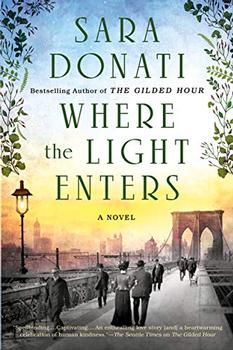Summary | Excerpt | Reading Guide | Discuss | Reviews | Beyond the Book | Readalikes | Genres & Themes | Author Bio

The seas were rough for much of the time, but that turned out to suit her: she had a strong stomach and poor weather meant she often had the deck to herself. She took her meals in her cabin, went out into the fresh air with Pip three or four times a day, and dozed the rest of the time away with a book on her lap. In a small notebook she wrote questions for Cap and tried to imagine his answers.
What is the world without you in it?
Midmorning, just two days out of New York, a lot of sudden movement on deck made Sophie go out to see what the trouble might be. She found herself in a crowd of curious passengers, all staring at the sight of some thirty people clinging to the side of a dead whale.
But no. It took some seconds to make sense of it: not a whale, but a capsized steamer almost completely submerged. The survivors huddled together in the middle of an expanse of wood that was barely afloat, waves washing over them so that they tilted one way and then another. Sophie was fairly new to sea travel and ships, but even she could see that the Cassandra had happened across this disaster almost too late.
The crew had already hauled four of the survivors aboard, men who looked like they had fought and lost a battle. Clothes in tatters, shoeless, salt-encrusted, terribly sunburned, they reminded her of the poor who lived on the streets in winter: dehydrated, near-starved, and so racked by exposure that sanity was frayed to the point of unraveling. Almost every one of them was injured: seeping head wounds, inflamed eyes, lacerations, a crooked arm immobilized by clothing torn into bloody rags, exhaustion.
Many of the Cassandra's passengers went to work alongside the crew, as eager to help as they were to hear the whole of the story. As each survivor was hoisted off the wreck he was swaddled like an infant in blankets and hurried off to the main dining hall, the largest room on the ship.
Sophie had started to believe that there were no women or children among the survivors when she saw a young couple being helped aboard. The woman looked close to collapse and her companion was only slightly better off. Sophie followed them into the dining hall and then, turning, snatched at a cabin boy who was rushing by.
"I'm in saloon number three. On the floor next to the writing desk you'll find a doctor's bag, quite heavy. Bring it to me as fast as you can, without delay."
She thought of Pip, who would be whining with worry, and called the cabin boy back.
"You know my dog, Pip?"
"Everybody knows Pip," the boy said. "He does tricks."
"Yes, he does. There's a marrow bone on a covered plate on the dining table, please give him that before you leave."
To his credit the boy loped off in the right direction without pausing to challenge or debate her request.
Neither of the survivors spoke to her, but they didn't turn her away, either, and Sophie took that as permission to do what she could for them. Another cabin boy came by with a pitcher of clean drinking water, and she stopped him.
"Glasses?"
He jerked his head toward a side table.
"Bring me two, immediately."
This time there was hesitation, and Sophie found herself falling into old habits. She straightened to her full height and looked at him as she would have looked at a student who failed to understand the simplest of concepts out of nothing more than laziness. He went to fetch the drinking glasses.
Sophie was more worried about the young woman. The young man was sunburned to the point of blisters erupting on his face, but his companion's coloring had a different source. She put her hand on the back of the young woman's head to help her take some water, and almost jerked away in surprise. Her skin was very hot and utterly dry to the touch.
She winced when Sophie spoke to her, turning her face away.
"Ma tête," she murmured. "Mal à la tête."
Excerpted from Where the Light Enters by Sara Donati. All rights reserved. No part of this excerpt may be reproduced or reprinted without permission in writing from the publisher.
Censorship, like charity, should begin at home: but unlike charity, it should end there.
Click Here to find out who said this, as well as discovering other famous literary quotes!
Your guide toexceptional books
BookBrowse seeks out and recommends the best in contemporary fiction and nonfiction—books that not only engage and entertain but also deepen our understanding of ourselves and the world around us.